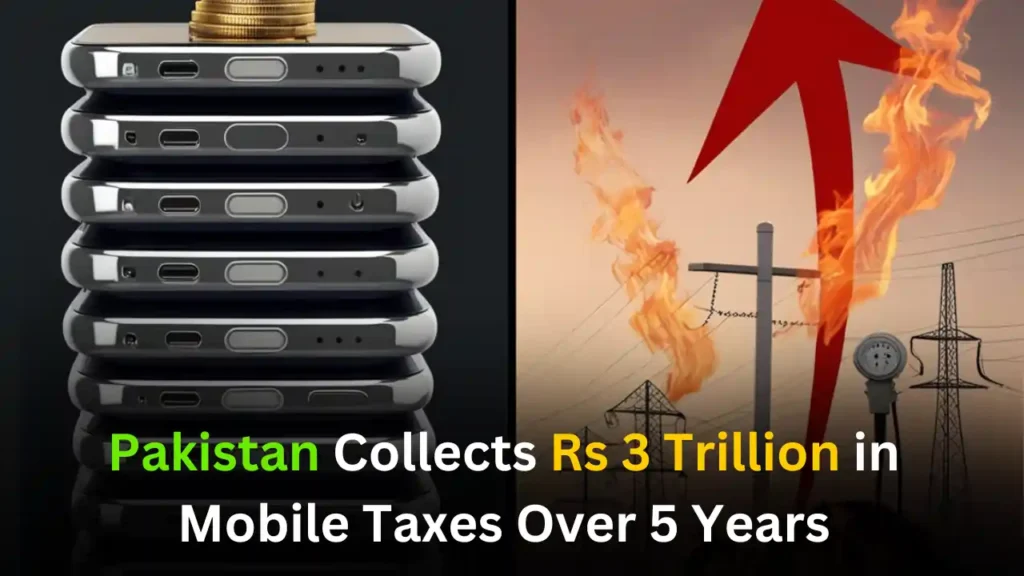
The Ministry of Finance has disclosed that Pakistan has collected an astounding Rs 3.38 trillion in Mobile taxes from mobile phone users over the last five years. This revelation was made during a session of the National Assembly, where the finance ministry presented detailed tax collection figures, shedding light on the increasing burden placed on mobile subscribers in the country.
According to the report, the tax collections from the telecom sector have played a significant role in the government’s revenue generation. With an ever-growing number of mobile phone users in Pakistan, these taxes have become a consistent source of income for the state. As of the end of August 2024, Pakistan’s mobile phone subscriber base stands at an impressive 193.098 million, indicating a vast and largely untapped market that has been subject to heavy taxation in recent years.
The figures revealed by the finance ministry indicate the extent to which the government has been leveraging the popularity of mobile communication in the country to generate revenue. Mobile phones have become an essential tool for communication, business, and even education in Pakistan, making it an easy target for the imposition of various taxes, including federal excise duty, sales tax, and other charges. source ary
While the taxation on mobile users has generated significant revenue, it has also raised concerns about the affordability of mobile services for the average consumer. The substantial tax burden, coupled with rising inflation, has made it increasingly difficult for low-income individuals and families to access essential services such as mobile communication and data usage. This has led to growing calls from consumer rights groups and opposition parties for a review of the tax policies and their impact on ordinary citizens.
In addition to the rise in mobile-related taxes, Pakistan has been grappling with skyrocketing inflation in recent months, with key utilities such as gas and electricity seeing unprecedented price hikes. According to the Pakistan Bureau of Statistics (PBS), the price of gas has surged by a staggering 800% within a mere four-month period. This alarming increase in gas tariffs has been a major concern for both consumers and businesses alike, with many fearing that these hikes will further exacerbate the already high cost of living.
The PBS report also highlights a worrying trend in food inflation, with the prices of essential commodities such as sugar, palm oil, soybean oil, wheat, and crude oil seeing significant increases over the past five years. Specifically, the price of sugar has surged by 53.5%, while palm oil has become 61% more expensive. These price hikes have been linked to the overall inflationary pressures that the country is currently facing, which are in turn largely attributed to the rising costs of electricity and gas.
The government has been implementing these price hikes as part of its commitments to the International Monetary Fund (IMF), which has provided financial assistance to Pakistan in exchange for structural reforms aimed at stabilizing the economy. As part of this agreement, the government has been forced to raise utility prices to reduce the fiscal deficit and meet the IMF’s fiscal targets.
In November 2023, the government implemented a jaw-dropping 520% increase in gas prices, followed by another 319% rise in February 2024. Electricity rates have also seen steep increases, with a 35% hike in November 2023 and a further 75% rise in February 2024. These price increases have been blamed for contributing to the escalating inflation rate, which has placed immense pressure on the budgets of average Pakistani households.
The sharp increase in utility prices has been compounded by the rising costs of essential food items, creating a perfect storm of economic challenges for the citizens of Pakistan. The surge in the prices of daily necessities, coupled with the burden of taxes on mobile services and other goods, has left many Pakistanis struggling to make ends meet.
While the government has defended these price hikes as necessary to meet international obligations and stabilize the economy, critics argue that these measures have disproportionately affected the most vulnerable segments of society. Opposition parties have called for greater transparency in the government’s negotiations with the IMF and have demanded a more comprehensive social safety net to protect low-income households from the adverse effects of inflation.
Moreover, there is growing concern that the combination of rising utility costs, taxes, and inflation could lead to widespread social unrest. The situation is further exacerbated by the lack of sufficient wage growth, which has not kept pace with the soaring costs of living. Many Pakistanis are finding it increasingly difficult to afford even the most basic necessities, such as food, electricity, and gas.
The government is under intense pressure to address the concerns of the public and find ways to ease the burden of rising prices. Economic experts suggest that measures such as targeted subsidies for vulnerable populations, fiscal reforms, and improved governance in the energy sector could help mitigate the impact of these price hikes on ordinary citizens.
However, with the looming deadline for meeting the IMF’s fiscal targets, it remains to be seen whether the government will be able to strike a balance between its international commitments and the welfare of its people. As inflation continues to rise and the cost of living becomes increasingly unaffordable for many, the government’s response to this crisis will be crucial in determining the country’s economic trajectory in the coming years.





